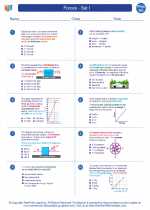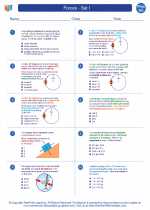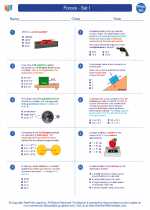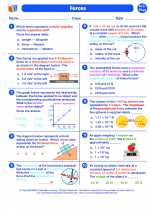Composition in Physics
Composition in physics refers to the arrangement, combination, and structure of different elements and materials. It involves the study of how different substances are made up and how they interact with each other. Understanding the composition of materials is crucial in various branches of physics, including mechanics, thermodynamics, and quantum physics.
Key Concepts
- Atoms and Molecules: At the most fundamental level, all matter is composed of atoms and molecules. Atoms are the basic building blocks of all elements, and they combine to form molecules.
- Elementary Particles: In particle physics, the composition of matter is studied at the level of elementary particles such as quarks, leptons, and bosons.
- Chemical Composition: Chemical composition refers to the types and proportions of elements present in a compound. This is crucial in understanding chemical reactions and the behavior of materials.
- Crystal Structure: In solid-state physics, the composition of materials is studied in terms of their crystal structure, which determines their mechanical, electrical, and thermal properties.
Study Guide
Here are some key topics and questions to guide your study of composition in physics:
1. Atoms and Molecules
- What are the different parts of an atom, and how are they organized?
- How do atoms combine to form molecules?
- What is the relationship between the composition of a molecule and its chemical properties?
2. Elementary Particles
- What are elementary particles, and what are their properties?
- How do elementary particles combine to form atoms and molecules?
- What is the significance of understanding elementary particle composition in particle physics?
3. Chemical Composition
- How is the chemical composition of a compound determined?
- What are the different types of chemical bonds, and how do they contribute to the composition of materials?
- How does the composition of a material affect its reactivity and behavior in different environments?
4. Crystal Structure
- What is the significance of crystal structure in the study of material composition?
- How do different crystal structures contribute to the mechanical, electrical, and thermal properties of materials?
- What techniques are used to analyze and understand the composition and structure of materials at the atomic and molecular levels?
Further Exploration
For a more in-depth understanding of composition in physics, consider exploring topics such as:
- Phase transitions and the composition of different phases of matter
- The composition of celestial bodies such as planets, stars, and galaxies
- The role of composition in the development of new materials and technologies
By studying the composition of matter in physics, you'll gain a deeper appreciation for the fundamental building blocks of the universe and their interactions at both the microscopic and macroscopic scales.
[Composition] Related Worksheets and Study Guides:
.◂Physics Worksheets and Study Guides High School. Forces - Set I
Worksheet/Answer key Forces - Set I
Forces - Set I  Worksheet/Answer key
Worksheet/Answer key Forces - Set I
Forces - Set I  Worksheet/Answer key
Worksheet/Answer key Forces - Set I
Forces - Set I  Worksheet/Answer key
Worksheet/Answer key Forces - Set I
Forces - Set I 

 Worksheet/Answer key
Worksheet/Answer key
 Worksheet/Answer key
Worksheet/Answer key
 Worksheet/Answer key
Worksheet/Answer key

The resources above cover the following skills:
PHYSICS
Motion and Stability: Forces and Interactions
Identify and analyze forces responsible for changes in rotational motion and develop an understanding of the effect of rotational inertia on the motion of a rotating object (e.g., merry-go-round, spinning toy, spinning figure skater, stellar collapse [supernova], rapidly spinning pulsar).